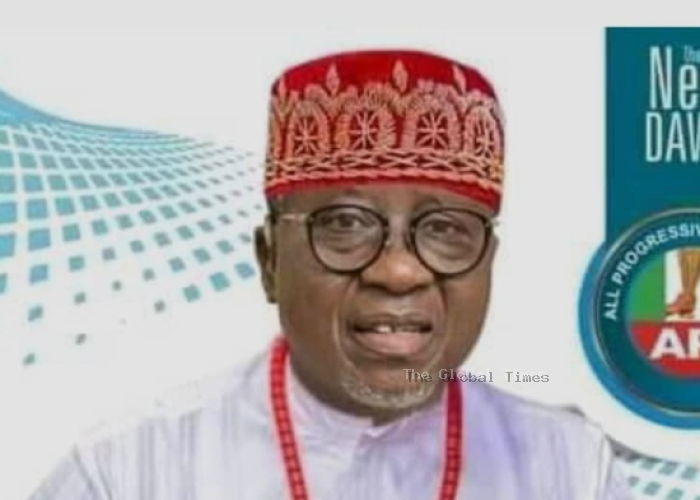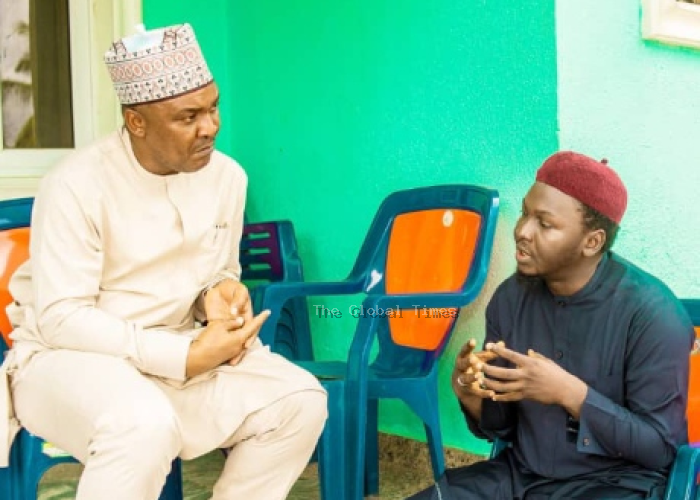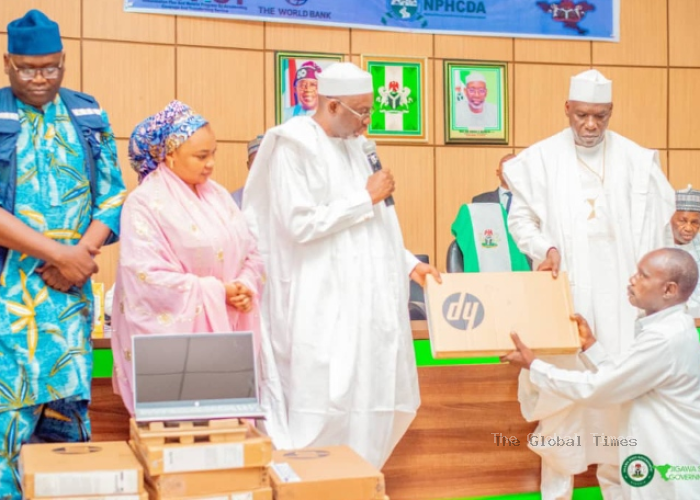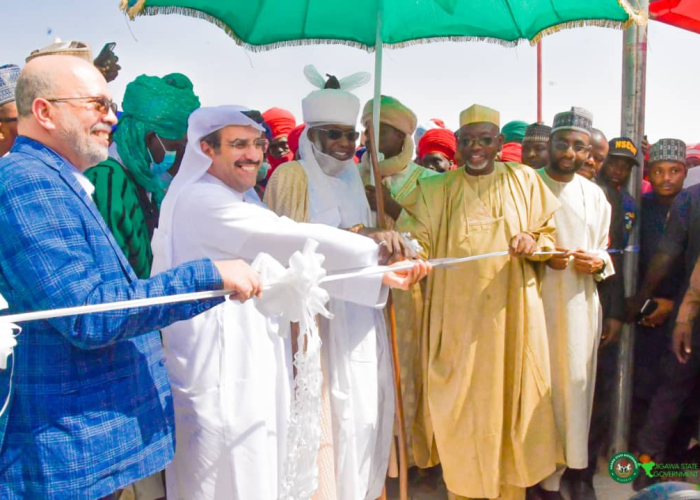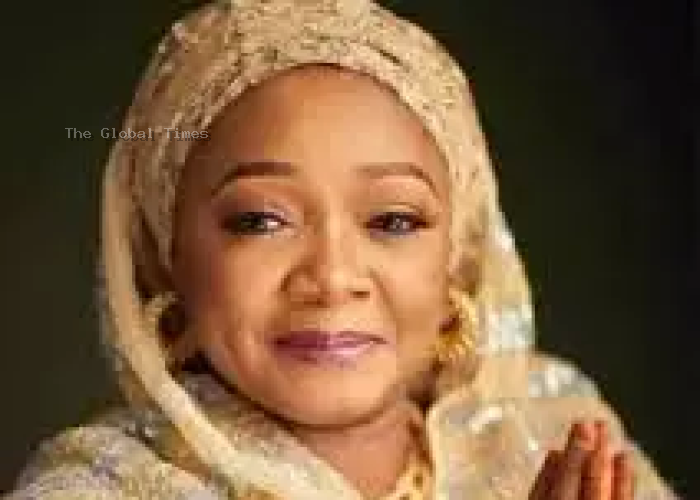
SENATOR UMAR TANKO AL-MAKURA: RIGHT MAN FOR POLITICAL REBIRTH, VIRILE APC

From Salihu Abdullahi Osuko, Giza
Since the dawn of this democratic dispensation, an easily identifiable challenge with large political parties in Nigeria has to do with the obvious inability to effectively manage transition periods, be it within the party, or outside of the political party.
It’s on record that previous attempts to produce leadership for political parties in the country, especially political parties in power, have generally led to rancour and bickerings, as contending forces battle each other for the control of the party.
Not only that, even the leadership that subsequently emerged, mostly as a results of issues trailing their emergence, such leadership became shrouded in controversies, which altogether, have negative consequences on their overall performance.
It’s easy to recollect the circumstances that led to the ouster of each and every of the previous leadership of the ruling All Progressives Congress (APC), commencing from the pioneer national chairman, Chief John Odigwe Oyegun to Comrade Adams Oshiomhole.
In each of the mentioned situations, the agitation leading to the emergence of the subsequent leadership were ill-defined, which further balkanised the party, paving the way for uncontrolled agitations, with factions endlessly engaged in the fight for a control of the party machinery.
Recall the circumstances that led to the sacking of the immediate past elected leadership of the party led by Comrade Oshiomhole. The raging crisis then saw to the emergence of three persons each laying claim to the position of the national chairman of the APC, admist conflicting court judgements obtained by contending factions.
The party’s national executive committee finally waded into the matter, after which it summoned a meeting which subsequently produced the Buni-led interim caretaker committee.
Recall when the APC prepares for its next national convention slated for next month, there still exist lots of issues threatening the unity of the party, resulting from the expected agitation for the control of the party. The next national chairman of the party that will emerge from the convention, will expectedly lead the party to the 2023 general elections, as such various contending power brokers are seeking to protect their interests.
In fact, this may be the reason that prompted the caretaker committee led by Yobe State governor, Mai Mala Buni, as Chairman, APC Caretaker and Extraordinary Convention Planning Committee (CECPC), to constitute a national reconciliation committee led by first executive governor of Nasarawa State, Senator Abdullahi Adamu, charged with the responsibility of reconciling aggrieved members of the party after the successful conduct of the party’s state congresses.
From previous experiences, it can be deduced that the position of the national chairman of big political parties, especially ruling parties, remains dicey and even short-lived, mostly as a result of contending issues leading to the emergence of such leadership.
Previous leadership successions within the APC could however be considered as
teething problems when viewed against the backdrop of the formation of the party, after then opposition parties went into alliance in order to defeat the then ruling Peoples Democratic Party (PDP) ahead of the 2015 general election.
It can be argued that, so far, the APC has grown from strength to the strength and it’s expected that the party should have no problem putting its house in order. However, an issue that could not be easily wished away ahead of the February national convention, is the fact that, President Muhammadu Buhari, who has been the rallying point for the party, will not be on the ballot come 2023.
This means that, the agitation for the control of the APC ahead of the 2023 general election, may rather assume different dimensions, especially that dinctinct power brokers within the party, are jostling to have their own as national chairman of the party.
Even though various individuals have made known their intentions to gun for the position of the national chairman of the APC, it is pertinent to understand that, agitations fueled by selfish, pirochial interests and even vendetta, may not necessarily serve the collective purpose of members of the party who aspire to see the party grow from strength to strength.
To this end, it’s to be expected that the party should endeavour to bring onboard a widely accepted candidate for the national chairman of the party, an individual with requisite capacity and experience to lead the party to another resounding success come 2023.
Such candidate for the APC national chairman should have a firm grasp of the basic, founding philosophy behind the formation of the party. In fact, such a person must be not only a founding member of the party, but must have played key role leading to the merger of legacy parties that gave rise to the formation of the APC.
The next national chairman of the APC must be a party man, whose vision and philosophy, is in tandem with the tenets and believes of the party. It should not be someone who will be foistered on the party merely for selfish interest.
Among the aspirants for the office of the national chairman of the APC, none can stand taller than Senator Umaru Tanko Al-makura. The two-term former governor of Nasarawa State, who presently represents Nasarawa South in the senate, possesses every requisite capacity and experience worthy of being the national chairman of the APC.
Senator Al-makura played key role leading to the alliance that brought about the formation of the APC. He is well grounded in the philosophy behind the APC. He is detribalised, a politician worth every ounce of his weight in gold.
Senator Al-makura has been at the forefront of the campaign for political rebirth, where Nigerians from across every
tribe, region, religion or social divide, can be given the chance through fair and just processes to aspire for political office.
Considering the call for cutting down on the cost in the country’s democratic governance, especially the undue use of money by political actors, which needlessly fuel and abate corruption and outright mismanagement of public resources, Senator Al-makura’s unflinching disposition for instilling accountability and prudence, will serve to engender political rebirth that will further endear the APC in the hearts of Nigerians.
Senator Al-makura remains the only candidate for the position of the national chairman of the party, who enjoys unfettered support from especially his home state, with his successor, Nasarawa State governor, Engineer Abdullahi Sule, being at the forefront of the campaign for his predecessor to become the next national chairman of the APC. This is not a fluke but a testimony of the lawmaker’s sterling leadership qualities.
Indeed, for the APC to get it right, it must be wary of aspirants who come into the contest either embedded in crisis of acceptability or lack experience in managing both people and resources, because as the saying goes, one cannot give what one does not have. Senator Al-makura can convincingly provide the APC with required leadership because he has successfully demonstrated that he is indeed a leader from every ramification, capable of managing both people and resources.


